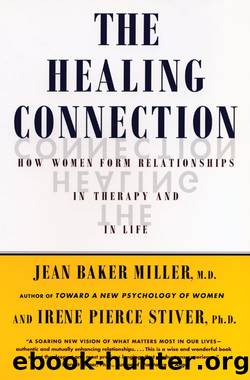The Healing Connection by Jean Baker Miller

Author:Jean Baker Miller [Miller, Jean Baker; Stiver, Irene Pierce]
Language: eng
Format: epub
ISBN: 978-0-8070-3966-3
Publisher: Beacon Press
Published: 1997-09-15T00:00:00+00:00
Role-Playing
The term ârole-playingâ covers a range of behaviors that reflect efforts to please, control, or gain the attention of significant people. Role-playing may be more or less problematic according to how pervasive it is and how nonauthentic, disengaged, or nonmutual the behaviors are.
A very common form of role-playing occurs whenever a person longs for a connection with someone who is more powerful and intimidating. Under such circumstances a person may quickly learn to read what the other person expects of him/her and then adopts that behavior, plays that role, to win that personâs approval.
The strategy of role-playing can begin very early. When children learn that they must hide their feelings or feel powerless to have a genuine impact on the important people in their lives, they soon come to disbelieve their inner experience and behave instead according to what they see as the expectations of others, or they learn how to âmanageâ or âcontrolâ others to gain some response from them. In many of the families weâve described, playing a role can serve to maintain family secrets and the denial of the truth of family problems, and to sustain the family myth that everyone is fine.
As they move into adulthood, children who learn to role-play develop personas that may become so firmly entrenched that they preclude authenticity in relational encounters. Role-playing can give the illusion of connection and of the presence of a real person when, in fact, the person is basically absent, not truly in touch with herself (or himself) and intent on behaving according to othersâ expectations. Role-playing can thus become a way of distancing from others. One man who is also a therapist writes, âI learned about smiling before I was five. . . . They all would smile back but they would never see me at all. I could sit behind my smile and watch.â5
Many women take on the role of caretaker as a result of societal pressures, but some men do also. Obviously, this can be the result of being parentified as a child, but people who were not obviously parentified can also adopt this role as a strategy of disconnection, and in either case it often becomes generalized to other relationships. To the extent that caretaking behavior does not arise from the loving feelings of true connection, it does not lead to feelings of zest, empowerment, or worthiness, since the way the person assumes the role involves attending to but not really connecting with the other person. It can be extremely painful to keep doing âgood things,â and maybe even being praised by some, but never feel really good inside.
Under these circumstances, people learn how to do caretaking tasks through playing a role, but their empathic sensibilities are often blockedâan indication of the nonrelational aspects of this kind of role-playing. For example, it is not uncommon to hear from adults who have been very parentified as children how resentful they feel about the caretaking that they do (many of these children become aware of the resentment only after theyâve been in therapy).
Download
This site does not store any files on its server. We only index and link to content provided by other sites. Please contact the content providers to delete copyright contents if any and email us, we'll remove relevant links or contents immediately.
| Acupuncture & Acupressure | Aromatherapy |
| Ayurveda | Chelation |
| Chinese Medicine | Energy Healing |
| Healing | Herbal Remedies |
| Holistic | Homeopathy |
| Hypnotherapy | Massage |
| Meditation | Naturopathy |
| Reference |
Inner Engineering: A Yogi's Guide to Joy by Sadhguru(6778)
The Power of Now: A Guide to Spiritual Enlightenment by Eckhart Tolle(5734)
Fear by Osho(4723)
Ikigai by Héctor García & Francesc Miralles(4222)
The Art of Happiness by The Dalai Lama(4117)
The Ultimate Bodybuilding Cookbook by Kendall Lou Schmidt(3921)
Yoga Therapy by Mark Stephens(3736)
The Little Book of Hygge by Meik Wiking(3673)
The Healing Self by Deepak Chopra(3559)
Why Buddhism is True by Robert Wright(3436)
The Hatha Yoga Pradipika (Translated) by Svatmarama(3311)
Being Aware of Being Aware by Rupert Spira(3263)
Shift into Freedom by Loch Kelly(3187)
Wild Words from Wild Women by Stephens Autumn(3131)
Work Clean by Dan Charnas(3104)
Happiness by Matthieu Ricard(3031)
More Language of Letting Go: 366 New Daily Meditations by Melody Beattie(3015)
Yoga Body & Mind Handbook by Jasmine Tarkeshi(2861)
Why I Am Not a Feminist by Jessa Crispin(2736)
